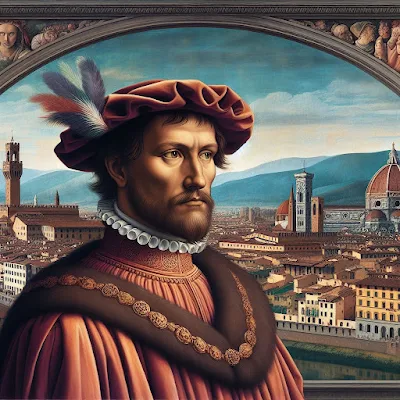Teachings from Machiavelli's speeches
We are going to summarize some of the teachings that Machiavelli offers us in his "Discourses" and that can be useful for our daily lives.
Niccolò Machiavelli was an Italian political thinker who lived in the 16th century and who wrote a work entitled "Discourses on the First Decade of Livy", in which he analyzes the history of the Roman Republic and draws lessons for the government and society of his time.
See Machiavelli's Strategies for your life
 |
| Teachings from Machiavelli's speeches |
The importance of laws and institutions
Machiavelli considers laws and institutions to be fundamental to preserving the freedom and stability of a republic. Without them, the people would be exposed to the tyranny of the powerful or the chaos of passions. For this reason, Machiavelli recommends that laws be clear, fair and adapted to the circumstances of each place and time. Furthermore, he proposes that institutions be balanced and participatory, so that all citizens have a say in public affairs and that abuses and corruption are avoided.
Thus, Machiavelli praises the Roman system, which combined three forms of government: monarchy (represented by the consuls), aristocracy (represented by the senate) and democracy (represented by the people). This mixture allowed each part to moderate the others and a harmonious order to be maintained.
The need for virtue and education
Machiavelli does not limit himself to describing laws and institutions, but also deals with the moral and cultural qualities of citizens. For him, virtue is the ability to act with prudence, courage, justice and generosity for the benefit of the community. Virtue is opposed to vice, which is the tendency to seek self-interest, pleasure, wealth or power without measure or scruple. Machiavelli maintains that virtue is the foundation of the greatness and happiness of a republic, while vice is the cause of its decline and ruin.
For this reason, Machiavelli insists on the importance of education, both public and private, to train citizens in the love of their country, respect for the laws, the cultivation of the arts and sciences, and the exercise of weapons. In this way, a free, cultured and strong society would be achieved.
The value of conflict and change
Machiavelli does not have an idealized or static vision of politics. On the contrary, he recognizes that history is full of conflicts and changes, both internal and external, that test republics. However, far from regretting or resigning, Machiavelli sees in these challenges an opportunity to renew and improve political life. According to him, the conflict between different social groups (such as the nobles and the people) can be beneficial if it is channeled through laws and institutions, since it generates debate, competition and reforms.
See Machiavelli's teachings in The Godfather
Likewise, change caused by historical circumstances (such as wars or crises) can be beneficial if it is used to adapt to new realities and to innovate solutions. Thus, Machiavelli defends an active and flexible attitude towards political problems, without fearing change or clinging to the past.
Be flexible and adapt your behavior to the circumstances
Machiavelli states that success depends on fortune and virtue, understood as the ability to act appropriately according to situations. There is no single way of behaving that is valid for all cases, but you have to know how to vary and adjust to what each moment requires. For example, sometimes you have to be generous and other times thrifty, sometimes you have to be bold and other times prudent, sometimes you have to be kind and other times severe. The important thing is not to be rigid or stubborn, but flexible and adaptable.
Take advantage of opportunities when they present themselves
Machiavelli maintains that fortune is like a river that changes course and that you have to know how to navigate it. We cannot fully control what happens to us, but we can be attentive and prepared to take advantage of favorable opportunities when they are offered to us. We must not miss opportunities out of fear or laziness, but rather act decisively and quickly. For example, if a door opens to us to advance in our professional career, we should not hesitate or delay, but take it with enthusiasm and determination.
Learn from experience and examples
Machiavelli says that the best teacher is experience, but he also recognizes the value of historical and literary examples. We should not rely only on our own opinion or our own intuition, but we must seek the knowledge and advice of others. We must not repeat the mistakes of the past, but rather learn from them and avoid them. We must not ignore the lessons of great men, but rather imitate and emulate them. For example, if we want to improve our public speaking, it is not enough to practice on our own, but we must study the speeches of the best speakers and follow their techniques and advice.
Be realistic and don't get carried away by illusions
Machiavelli affirms that man is a political animal that lives in society and seeks his own well-being. He does not deny the existence of moral or religious values, but neither does he idealize them or impose them as absolute norms. What he proposes is a pragmatic and rational vision of reality, based on facts and not fantasies. We must not be fooled by appearances or promises, but we must see things as they are and not as we would like them to be. We must not give up our dreams or our ideals, but we must not lose contact with reality or our interests either.
Prudence in decision making
In his unique wisdom, Machiavelli advocates prudence as a guiding light in decision making. He warns against impetuosity and recklessness, noting that the reflective pause before acting is crucial. This lesson translates directly to everyday life, where hasty decisions often lead to unintended consequences. Prudence, according to Machiavelli, acts as a shield against the dangers of impulsivity.
Reality as a basis for action
Machiavelli, known for his realist approach, emphasizes the importance of understanding reality rather than relying on utopian ideals. This lesson applies to daily life, reminding us that our actions must be rooted in concrete reality, rather than idealizing situations that may not be achievable. Acceptance of reality leads to more effective and adaptive decision making.
Adaptability in a changing world
In his speeches, Machiavelli highlights the need to adapt to changing circumstances. This lesson is invaluable in everyday life, where rigidity can be detrimental. Being able to adjust strategies and approaches in the face of life's unexpected turns is an essential skill that Machiavelli promotes. Adaptability allows us to not only survive but thrive in a constantly evolving world.
The art of persuasion and effective communication
Machiavelli was a master in the art of political persuasion. Extrapolating this skill to the personal level, the ability to communicate effectively becomes essential. Learning to present ideas persuasively, understanding the motivations of others, and building strong relationships are crucial lessons that Machiavelli bequeaths us for everyday life.
Trust your own ability to make decisions
Through his writings, Machiavelli encourages self-confidence when making decisions. This lesson is transcendental in daily life, where self-confidence serves as a catalyst for action. Indecision can be paralyzing, and Machiavelli urges us to trust our ability to evaluate situations and make decisions with conviction.
These are some of the lessons for everyday life extracted from Machiavelli's speeches. As we see, these are lessons that not only have to do with politics, but also with ethics, culture and psychology. Machiavelli invites us to reflect on our human condition, our society and our destiny, and to search for a better way to live in a complex and changing world.
It is not about following them to the letter or turning them into dogmas, but rather taking them as references and suggestions to improve our way of thinking and acting. As Machiavelli himself says: "I do not want to write anything other than what may be useful to someone who understands it."






Comments
Post a Comment